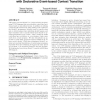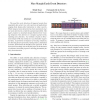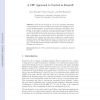506 search results - page 20 / 102 » Learning Event Durations from Event Descriptions |
AAAI
1993
13 years 8 months ago
1993
In planning tasks an agent may often find himself in a situation demanding that he choose an action that would prevent some unwanted event from occurring. Similarly, in tasks invo...
AOSD
2011
ACM
13 years 1 months ago
2011
ACM
This paper proposes EventCJ, a context-oriented programming (COP) language that can modularly control layer activation based on user-defined events. In addition to defining cont...
CVPR
2012
IEEE
11 years 9 months ago
2012
IEEE
The need for early detection of temporal events from sequential data arises in a wide spectrum of applications ranging from human-robot interaction to video security. While tempor...
IFM
2010
Springer
13 years 5 months ago
2010
Springer
Event-B has emerged as one of the dominant state-based formal techniques used for modelling control-intensive applications. Due to the blocking semantics of events, their ordering ...
AGP
1994
IEEE
13 years 11 months ago
1994
IEEE
Kowalski and Sergot's Event Calculus (EC) is a formalism for reasoning about time and change in a logic programming framework. From a description of events which occur in the...



